
Great woman belong to history and to self sacrifice.






“Great women belong to history and to self-sacrifice.” — Thus spoke Leigh Hunt, poet of the Romantic age, whose heart overflowed with reverence for the noble and the compassionate. In these few words, he honors a truth that has echoed through the corridors of civilization: that the greatness of women is not measured by wealth or renown, but by the depth of their devotion—their willingness to give of themselves for others, for love, for truth, and for the eternal cause of goodness. Hunt, a man of letters who saw both the glory and the pain of human striving, knew that women had too often been denied their rightful place in the chronicles of history. Yet he declared that they belong there—not by conquest or by power, but by sacrifice, that sacred act by which the soul transcends itself.
To say that great women belong to history is to recognize that they are the unseen architects of civilization. Their labor, their love, and their courage have built the foundations upon which the world stands. While kings and conquerors have carved their names into stone, it is women who have written history in the quiet ink of endurance—through the cradle, the battlefield, the sickbed, and the flame of faith. Their greatness does not always bear the title of “hero,” for it often moves unseen. Yet history, the true history of the human heart, remembers them still.
Hunt’s second phrase—“and to self-sacrifice”—unites the temporal and the eternal. For self-sacrifice is not merely an act of loss; it is an act of transformation. To sacrifice the self is to give one’s life or comfort for something greater, and in that giving, to become immortal. The woman who sacrifices out of love does not vanish—she becomes a part of the world’s moral memory. Such sacrifice has appeared in countless forms: the mother who gives her youth to her children; the healer who stands between disease and despair; the thinker or artist who dares to speak truth in a time of silence. Hunt saw in these lives not weakness, but divinity—for in every act of selfless giving, the human spirit touches the realm of the divine.
Consider Florence Nightingale, whose lamp burned through the nights of war. She walked through fields of suffering, tending to the wounded of both friend and foe. Her body was frail, but her spirit shone like a torch in the darkness. She gave up wealth, comfort, and society’s approval to serve the nameless and the dying. In her sacrifice, she changed the face of medicine and nursed the soul of a weary world. Such a life exemplifies Hunt’s vision: a woman whose greatness belonged not only to her time, but to history itself, because she gave herself wholly to the good of others.
Yet, self-sacrifice need not always wear the garments of sainthood. It can be found in quiet hearts, in daily acts of perseverance. Think of Harriet Tubman, who, born a slave, risked her life again and again to lead her people to freedom. She did not wield armies or crowns; her weapon was courage, her power was compassion. When she might have sought safety for herself, she returned instead to danger, guided only by the North Star and the voice of conscience. Her story, like Nightingale’s, proves that the truest greatness is not bestowed—it is earned in service, through the willing offering of one’s life to something sacred and just.
In these examples, we see that the bond between greatness and self-sacrifice is not a burden, but a blessing. For to live only for oneself is to live small and die forgotten; but to live for others is to join the eternal chorus of those who built the better parts of the world. The great woman, as Hunt saw her, is not defined by submission but by strength—by the strength to give when giving costs everything. She does not seek applause, for her reward lies in the quiet triumph of knowing that others may walk safely because she has walked before them.
Let this be your lesson, my listener: that true greatness—whether in woman or man—lies not in the grasping of power but in the surrender to purpose. When you give of yourself to truth, to kindness, to justice, you join the living history of the noble and the brave. Do not mistake sacrifice for weakness; it is the highest form of strength, the kind that endures when empires fall.
And so remember, as Leigh Hunt teaches, that great women belong to history and to self-sacrifice, for they embody the finest union of heart and spirit. They are the keepers of compassion, the guardians of humanity’s light. Their names may be whispered, not shouted; their deeds may be unrecorded by books, but they are written upon the soul of the world. Aspire, then, to such greatness: to give, to endure, and to love so deeply that your life, too, may become part of the timeless song of those who made the world gentler by the grace of their sacrifice.






AAdministratorAdministrator
Welcome, honored guests. Please leave a comment, we will respond soon